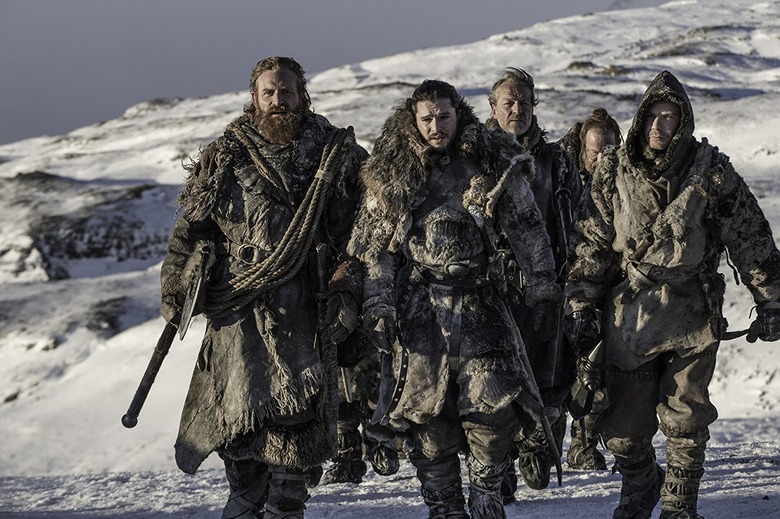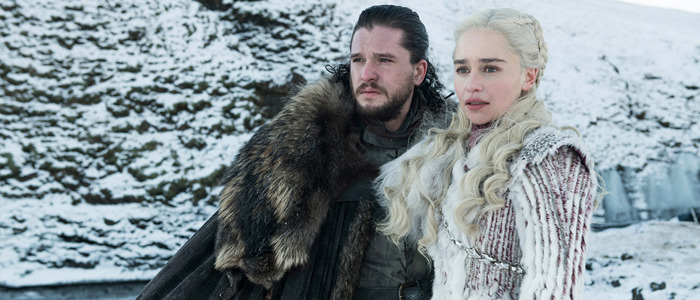The 'Game Of Thrones' Final Battle Is Bigger (And More Miserable To Make) Than Helm's Deep
Game of Thrones has become renowned for its ambitious, sprawling battle sequences, but the HBO fantasy show's final battle may just take the cake. And how could it not, after 11 grueling weeks of night shoots and more characters than ever coming together for an epic fight against an Army of the Dead? But it turns out that the Game of Thrones season 8 final battle will not only be the biggest battle sequence in the history of the show, it will be the biggest sustained battle sequence in cinematic history — topping even Lord of the Rings' 40-minute Helm's Deep scene. And with all the fake and real, blood, sweat, and tears that went into the making of the battle, it better be.
The Grueling Battle to Shoot the Final Battle
In Entertainment Weekly's on-set report on the final season of Game of Thrones, showrunners David Benioff and Dan Weiss, as well as the cast and crew of the HBO series, revealed what went into the final few episodes of the series. Primarily, what went into the three-month shoot that would become the battle of Winterfell — a brutal, torturous production known internally as "The Long Night."
"What we have asked the production team and crew to do this year truly has never been done in television or in a movie," says co-executive producer Bryan Cogman, adding:
"This final face-off between the Army of the Dead and the army of the living is completely unprecedented and relentless and a mixture of genres even within the battle. There are sequences built within sequences built within sequences. David and Dan [wrote] an amazing puzzle and Miguel came in and took it apart and put it together again. It's been exhausting but I think it will blow everybody away."
Directed by Miguel Sapochnik, who won an Emmy for directing the acclaimed battle-heavy episode, "The Battle of the Bastards," Game of Thrones' final battle will be the longest sustained action sequence in cinematic history. Sapochnik frequently studied the most famous prolonged battle sequence, Lord of the Rings' Helm's Deep, to attempt to avoid giving audiences "battle fatigue."
"One thing I found is the less action — the less fighting — you can have in a sequence, the better," the director said. But Sapochnik gave himself a more arduous task than simply sustaining the action for 40-plus minutes. The director and producers decided to make things harder for themselves by filming the sequence across 11 straight weeks, rather than in truncated sections — something that even big-budget productions like Marvel or Star Wars don't even do:
"We built this massive new part of Winterfell and originally thought, 'We'll film this part here and this part there,' and basically broke it down into so many pieces it would be shot like a Marvel movie, with never any flow or improvisation. Even on Star Wars, they build certain parts of the set and then add huge elements of green screen. And that makes sense. There's an efficiency to that. But I turned to the producers and said, ”I don't want to do 11 weeks of night shoots and no one else does. But if we don't we're going to lose what makes Game of Thrones cool and that is that it feels real.'"
It will be unforgettable all right — or at least, an experience the cast and crew would rather forget. The long nights, freezing temperatures, and harsh conditions resulted in several on-set injuries, including a crew member suffering an asthma attack and a "series regular" actress fainting on set.
"Nothing can prepare you for how physically draining it is," Maisie Williams, who plays Arya Stark, said of her first big battle scene. "It's night after night, and again and again, and it just doesn't stop. You can't get sick, and you have to look out for yourself because there's so much to do that nobody else can do... there are moments you're just broken as a human and just want to cry."
"It was the most unpleasant experience I've had on Thrones," Ser Jorah Mormont actor Iain Glen added. "But...on screen it bleeds through to the reality of the Thrones world."
Benioff and Weiss Tease the Ending
The cast and crew hope the misery endured pays off with an ending that will be satisfactory to the audiences who have stuck with Game of Thrones for nine years."We want people to love it," Weiss told EW. "It matters a lot to us." He added:
"We've spent 11 years doing this. We also know no matter what we do, even if it's the optimal version, that a certain number of people will hate the best of all possible versions. There is no version where everybody says, 'I have to admit, I agree with every other person on the planet that this is the perfect way to do this' — that's an impossible reality that doesn't exist. I'm hoping for the Breaking Bad [finale] argument where it's like, 'Is that an A or an A+?'"


